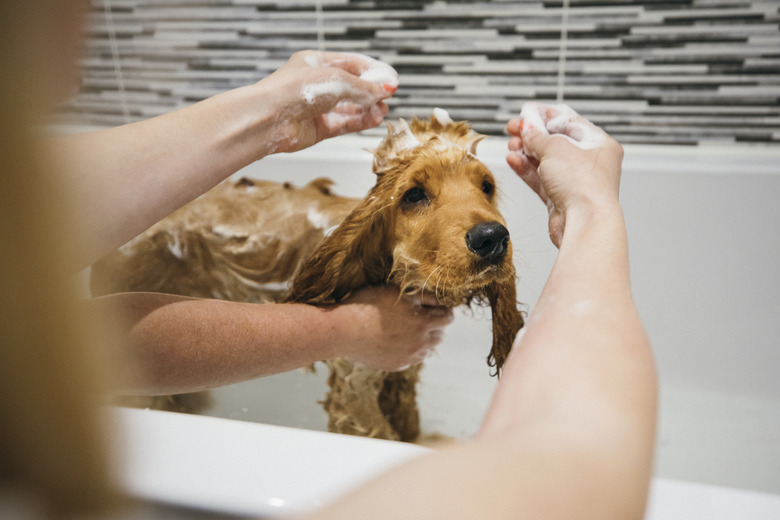No Dog Shampoo, What Can I Use? Here Are Some Dog Shampoo Substitutes
We may receive a commission on purchases made from links.
Cuteness may earn compensation through affiliate links in this article.
My dog needs a bath but I have no dog shampoo, what can I use? If you're in a bind and need to scrub your dog clean, or if you just wish to treat her skin and fur with more natural solutions, you can look to several alternatives to get the job done. If you need to rinse away dirt, dander, fleas or just an unwanted odor, you can substitute store-bought dog shampoo with a number of items from around the house.
Dog shampoo substitute
Dog shampoo substitute
If you find yourself with a dirty dog and no shampoo, just about anything that produces suds can work as a dog shampoo substitute in a pinch, from hand soap to your own shampoo. These detergents can have a drying effect on the skin, however, and shouldn't really be used as a regular alternative to dog shampoo.
You can create your own homemade dog shampoo with basic staple ingredients from around the house, but the trick is to make sure the pH levels of what you're creating are well-balanced as not to irritate the skin. PetCareRx states that baking soda, with a pH of 8.3 is an alkaline ingredient to clean with, while highly acidic vinegar ranks in at 2.2 — an average pH of around 7 is ideal for dogs, so keep this in mind when mixing acids and bases.
If a chemistry lesson isn't what you had in mind when creating your own dog shampoo, you can also use a more gentle cleanser that's ready to go — castile soap. Sold in liquid and solid bar forms, castile soap is olive-oil based and safe for nearly all skin types and is considered environmentally friendly. One great type of castile soap is Dr. Bronner's Unscented pure castile soap, which is a personal fave in many households, and one you can share with your dog without fear of over-drying.
Treating dirt and odor
Treating dirt and odor
To make your own homemade dog shampoo for odor, The Humane Society has a DIY solution for the smelliest problem of them all: getting skunked. They suggest mixing 4 cups of hydrogen peroxide (3%,) ¼ cup of baking soda and a teaspoon of dishwashing soap in a large container before rubbing it into your dog's fur and skin. Take care to avoid the eyes, nose, and mouth when applying and don't leave the solution on for too long as it can bleach darker fur.
Of course, your dog doesn't need to go to the great lengths of getting sprayed by a skunk to be deodorized. Natural deodorizers also include baking soda and vinegar, the latter of which kills odor-causing bacteria. Vinegar can also be subbed if you don't have peroxide on hand for the skunk-treatment recipe, or if you just want to use a more gentle, chemical-free ingredient.
Treating fleas and itchy skin
Treating fleas and itchy skin
Sometimes, dogs need to be scrubbed clean to treat issues other than grimy fur, like flea infestations. Dawn dish soap has been widely used as a flea killer for dogs and can make a good, cheap alternative to dog shampoo in a pinch. Flea Science states that the dish soap kills fleas by lowering the surface tension of water and breaks down their hard, waxy exteriors, which eventually drowns them. Chemical dish soap like Dawn is much harsher and more drying than most shampoos, however, and should really only be used occasionally, not as a regular shampoo treatment.
If irritated or itchy skin is an issue your dog could use some relief from, you can make a skin-soothing dog shampoo in minutes using items from your kitchen cupboard. The American Kennel Club recommends mixing one cup of oat flour (you can also beat a cup of oats in a blender until it reaches a powder consistency) with ½ cup of baking soda and 4 cups of warm water to create a DIY shampoo for dry skin.
Gently rub the mixture onto your dog's wet skin and allow it to sit for a few minutes before rinsing away and towel drying. For additional hydration, you can turn this into a homemade dog shampoo with coconut oil recipe by adding a tablespoon of coconut oil, which may also help reduce inflammation associated with itching.
